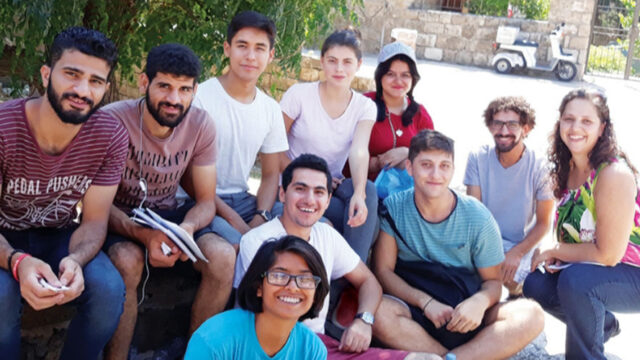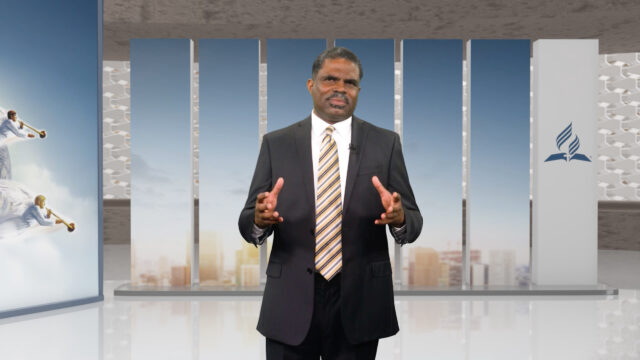How to avoid infection from another pandemic

This article is adapted from a presentation made for the Spring Meeting of the General Conference Committee, April 7, 2020. Some of the oral style has been preserved.—Editors.
The world is caught in the grip of a life-threatening pandemic: COVID-19. More than 2 million people have been infected, more than 125,000 people have died, and the numbers are skyrocketing.
One of the greatest needs of medical professionals is for personal protective equipment (PPE), protective clothing, helmets, gloves, face shields, goggles, face masks, respirators, and other equipment designed to protect wearers from injury and prevent them from being exposed to infection or illness.
When used properly, PPE acts as a barrier between infectious materials (such as viral and bacterial contaminants) and skin, mouth, nose, or eyes (mucous membranes). Since COVID-19 is airborne, it’s crucial for medical professionals to have the necessary protective equipment. American hospitals have seen protests from medical workers, specifically nurses, who haven’t had the personal protective equipment they’ve needed.
One of the surprising things is the number of health-care workers, physicians, physician assistants, nurse practitioners, and nurses who have contracted COVID-19. In Spain, more than 12,000 health-care workers have tested positive for the COVID-19 virus, and in China’s Hubei province (the center of the outbreak), it’s reported that 3,300 nurses tested positive. In the United States, although we don’t yet have solid statistics, we know that the number is in the thousands.
Although health-care workers are busy serving others, they aren’t immune to the virus. They need personal protective equipment.
Another Deadly Pandemic
Another deadly pandemic is even more fatal than the coronavirus. Sin’s virus has infected the entire human family, and we’re on the front lines of the battle. Church administrators, pastors, departmental directors, and gospel workers of all types also need personal protective equipment. If in our busyness we neglect our personal protective equipment, we are likely to be infected with the virus of sin. If in our frantic rush to minister to others we don’t have on our protective equipment, we, too, may contract a fatal disease.
The apostle Paul must have had something like this in mind when he wrote: “For we do not wrestle against flesh and blood, but against principalities, against powers, against the rulers of the darkness of this age, against spiritual hosts of wickedness in the heavenly places. Therefore take up the whole armor of God, that you may be able to withstand in the evil day, and having done all, to stand” (Eph. 6:12, 13).1 The armor of God is our PPE—our personal protective equipment against the virus of sin.
A medical professional wouldn’t think of entering a coronavirus patient’s room without wearing protective gear. Every day we gospel workers enter the evil one’s territory, where millions are infected by the virus of sin. We aren’t immune. To enter unprotected is spiritual disaster.
Clothed With the Armor of God
Not long ago a respected church administrator was discussing the challenges of ministry with one of his colleagues. The discussion turned to their devotional life and its relationship to busyness. The administrator made this fascinating and tragic admission: “With everything I do and all my administrative responsibilities, I’m just too busy to spend any significant time in prayer or Bible study. That’s my wife’s thing, not mine.”
After a regional pastor’s meeting, one of the pastors in attendance approached the speaker and asked if they could have a private discussion. When they were alone in a quiet corner of the room, the pastor said something like this, “No one knows this, but I’m exhausted, burned out, fatigued. I can no longer function in ministry. I’m out of gas and running on fumes. Can you help me?”
Chuck Swindoll, in his book Intimacy With the Almighty,2 comments: “Noise and words and frenzied, hectic schedules dull our senses, closing our ears to His still, small voice and making us numb to His touch.”
Someone has said, “Superficiality is the curse of our age. The doctrine of instant satisfaction is a primary spiritual problem. Our greatest need is not for a greater number of intelligent people, or gifted people, but for deep people.”
When we’re incredibly busy, when we perceive that we have more to do than we have time to accomplish it, it’s very easy to neglect the deep, reflective prayer and Bible study that’s transformational.
Keeping Our First Love
In Revelation, John describes the church at Ephesus: “I know your works, your labor, your patience, and that you cannot bear those who are evil. . . . Nevertheless I have this against you, that you have left your first love” (Rev. 2:2-4).
John Stott put it this way: “Their first flush of ecstasy had passed. Their early devotion to Christ had cooled. They had been in love with Him, but they had fallen out of love.”
Duty overshadowed devotion. What they did for Christ surpassed who they were in Christ. Doing became more important than being. They were defenders of the faith, but they lost sight of Him whom they were defending. They preserved an orthodoxy at the expense of knowing Christ. Their work for Christ became more important than their relationship with Him.
Busyness with the business of the church overshadowed the priority of the gospel, which is knowing Christ, experiencing His grace, internalizing the truths of Scripture, and sharing the message of His love in active mission.
Here are two biblical illustrations of busyness: one from the Old Testament, one from the New Testament.
“Busy here and there, he was gone” (1 Kings 20:40) summarizes this moment in the narrative. Here’s the background of this story. Ahab, king of Israel, battled Ben-Hadad, king of Syria. When Israel won the battle, Ahab and Ben-Hadad signed a peace treaty, and Ahab let Ben-Hadad get away.
The prophet of God disguised himself and waited for King Ahab by the side of the road. He said he had been beaten because a prisoner in his care had escaped. He said, “While your servant was busy here and there, he was gone” (ibid.). The prophet’s illustration is clear. The king had commissioned him to guard the prisoner, but he was so busy that he failed in the task he was called to do.
The point is simply this: busyness causes us to lose something valuable. Busyness may cause us to miss the very assignment we were called to accomplish. Busyness may cause us to confuse our priorities. Busyness may cause us to forget our true life’s purpose. Busyness may cause us to substitute activity for godliness.
The second illustration of losing something precious in busyness is found in the experience of Jesus’ parents, Mary and Joseph. Jesus’ parents were preoccupied, busy here and there (see Luke 2:41-49).
We know the story well. At 12 years of age, Jesus’ parents brought Him to Jerusalem to participate in the Feast of the Passover. When the Passover was over, they began making their way home, along with thousands of other worshippers. In the busyness of their lives, they neglected to notice that their 12-year-old son, Jesus, was not with them.
The fascinating thing about this story is that Mary and Joseph were not doing anything wrong. They were handling the duties of the day, visiting with friends, calmly traveling home. They were so busy, so caught up with the daily activities of the journey, that they didn’t notice Jesus was missing.
If you have ever lost a child in a crowd, you can identify with their feelings of absolute horror. Mary and Joseph immediately began to frantically search for Jesus, and they eventually found Him in the temple.
Commenting on this experience, Ellen White adds these insightful thoughts: “By one day’s neglect they lost the Saviour; but it cost them three days of anxious search to find Him. So with us; by idle talk, evilspeaking, or neglect of prayer, we may in one day lose the Saviour’s presence, and it may take many days of sorrowful search to find Him, and regain the peace that we have lost.”3
The Perils We Face
When the busyness of life overwhelms us, three things begin to happen.
We begin to lose focus. The events of the present seem to overwhelm us. The challenges of life seem much larger, and we focus on the problems rather than on God, who can solve them. In our busyness we focus on human answers to our dilemma rather than on divine solutions.
We become physically, mentally, and emotionally exhausted. We say things and do things we later regret. Busyness leads to tiredness; tiredness leads to burnout; and burnout leads to discouragement. Busy people often make quick judgment decisions and fail to see the larger picture, because they’re so busy that they need to get on to solve the next problem or the next task on their to-do list. They’re left with little time to reflect on the best solution to the problem they face.
Our devotional life suffers. We begin to neglect prayer and Bible study. Busyness produces tiredness; and tiredness produces inefficiency, lack of discipline, inability to control one’s feelings, and an erosion of a meaningful devotional life.
Ellen White put it this way: “All who are under the training of God need the quiet hour for communion with their own hearts, with nature, and with God. In them is to be revealed a life that is not in harmony with the world, its customs, or its practices; and they need to have a personal experience in obtaining a knowledge of the will of God. We must individually hear Him speaking to the heart. When every other voice is hushed, and in quietness we wait before Him, the silence of the soul makes more distinct the voice of God. He bids us, ‘Be still, and know that I am God.’ Psalm 46:10. This is the effectual preparation for all labor for God. Amidst the hurrying throng, and the strain of life’s intense activities, he who is thus refreshed, will be surrounded with an atmosphere of light and peace. He will receive a new endowment of both physical and mental strength. His life will breathe out a fragrance, and will reveal a divine power that will reach men’s hearts.”4
Have you ever felt that you’re running from one thing to the next, overwhelmed with the busyness of life? There’s one more e-mail to answer, one more text message to respond to, one more phone call to make, one more committee to attend, one more person to see. Your life seems to be governed by “one more.” You have just too much to accomplish. When you flop into bed at night you think about all you’ve left undone. Your work is certainly not finished; your to-do list is half done at best; your mind is racing; sleep does not come as you frantically attempt to think how you can cram more into an already overloaded schedule.
Heaven’s call in the midst of the COVID-19 pandemic is for us to put on our personal protective equipment, to spend time with God’s Word. Let the beauty of Scripture bathe your soul. Find that quiet spot and allow the Holy Spirit to move in your life. Sense anew the unmerited, undeserved, unearned grace of God.
1 All Bible texts are from the New King James Version. Copyright ã 1979, 1980, 1982 by Thomas Nelson, Inc. Used by permission. All rights reserved.
2 Charles Swindoll, Intimacy With The Almighty (Nashville, Tenn.: Nelson Thomas, Inc., 2000).
3 Ellen G. White, The Desire of Ages (Mountain View, Calif.: Pacific Press Pub. Assn., 1898, 1940). p. 83.
4 Ellen G. White, The Ministry of Healing (Mountain View, Calif.: Pacific Press Pub. Assn., 1942), p. 58.








